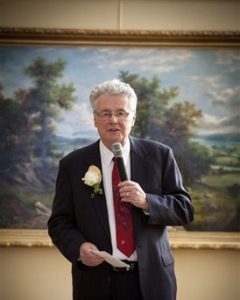 Professor John N. Murphy, McGowan’s first executive director, passed away on June 13, 2023, from complications related to Parkinson’s Disease. He was 83.
Professor John N. Murphy, McGowan’s first executive director, passed away on June 13, 2023, from complications related to Parkinson’s Disease. He was 83.
A pioneering scientist and engineer, as well as a devoted father and husband, Prof. Murphy’s work helped advance Pittsburgh’s prominence in the global scientific community.
Whether he was working as Director of the Pittsburgh Research Center of the U.S. Bureau of Mine Safety, collaborating with NASA on propulsion systems for manned space travel, teaching in the classroom at the University of Pittsburgh, or in a leadership role at the McGowan Institute, “he was inseparable from the work he was doing and the impact he was having,” stated his son Michael Murphy in an interview with the Pittsburgh Post-Gazette. “He really believed in it, and it was the most important thing.”
Prof. Murphy’s passion for the work he was doing extended, too, to volunteering. For instance, when his son became a Boy Scout, Prof. Murphy not only became an assistant scoutmaster and later a committee chair, he also wrote his own merit badge – Mining in Society. The badge teaches about the role mining has had in history and how it continues to impact daily life.
According to his son, one of Prof. Murphy’s favorite phrases was “Silence is the better part of valor.” He believed that listening and serving were more important than speaking. “He was very giving of himself and his time. He always put himself behind other people and they were attracted to him because of that humility. They recognized how smart he really was when he came to the table with zero pretense.” Put simply, “He was brilliant.”
Prof. Murphy’ legacy of innovation, leadership, mentorship, and passion for his work will be carried on at the McGowan Institute.
He is survived by his wife Catherine, son Michael, brothers Thomas and Richard, and three grandchildren.
The full obituary in the Pittsburgh Post-Gazette can be found here.
An article on some of Prof. Murphy’s many achievements can be found here.
Parts 1 and 2 of Prof. Murphy’s interview with the Oral History Center at the University of Berkeley can be found here and here respectively.
